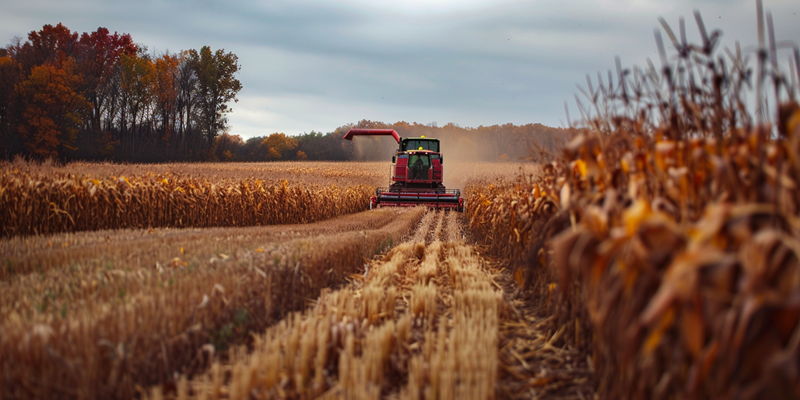In an era where innovation is pivotal, agriculture stands at the threshold of a transformative leap. With the fusion of blockchain and artificial intelligence (AI), revolutionary changes are being shaped within the sector. Smallholder farmers, often sidelined in the digital revolution, are the focal point of a new agricultural paradigm, championed by Dimitra Incorporated. Jon Trask, CEO of Dimitra, is at the helm of integrating these advanced technologies to create a more inclusive, productive, and sustainable industry that supports the backbone of our global food system.
Harnessing Blockchain for Agricultural Transformation
Blockchain technology is emerging as a powerful force in agriculture, promising to reshape how we think about farming and food production. Its decentralized nature aims to democratize and simplify the agricultural supply chain, placing power into the hands of farmers and various stakeholders. By integrating blockchain, smallholder farmers gain greater visibility and entry into the global market. Through transparent, immutable records, trust is established as consumers can trace the journey of their food from farm to fork, assuring them of its origins and handling.
Equally important is the technology’s capacity to eliminate bottlenecks and reduce the reliance on intermediaries. Blockchain empowers vulnerable groups such as small-scale farmers, who often face significant challenges in accessing global markets. This becomes particularly crucial as they strive to achieve better pricing, fair trade, and recognition for their tireless efforts in feeding the planet.
AI: Enhancing Farming Through Predictive Models
The symbiotic relationship between AI and blockchain holds vast potential in modern-day farming. AI utilizes the secure, verified data from blockchain platforms to forge predictive models that refine farming tactics, optimize resource use, and bolster sustainability. These models can provide invaluable insights into crop health, soil quality, and environmental conditions, effectively informing farmers’ decisions and actions.
The novel concept of crypto assets serves as an additional incentive for farmers to contribute their data. As farmers share more information, AI’s predictive capabilities improve, thus creating a virtuous circle. The data collaboration not only enhances individual farm productivity but contributes to a more resilient agricultural ecosystem that can withstand climatic and economic fluctuations.
Dimitra’s Global Platform for Smallholder Farmers
In realizing the tremendous promise of technology for agriculture, Dimitra has positioned itself as an accessible global platform for smallholder farmers. It offers diverse tools, including real-time data analysis, AI-backed recommendations, and satellite tracking. These capabilities furnish farmers with the precise information and guidance they need for managing their farms more efficiently.
At the heart of this ecosystem is the DMTR token, Dimitra’s cryptocurrency, which facilitates access to the innovative services provided by the platform. Beyond a mere transactional tool, the token is a catalyst for community building and mutual support among farmers worldwide. With every data entry and shared insight, Dimitra’s network grows stronger, lending farmers the collective strength of a community to leverage technological advances for their benefit.
Ensuring Compliance with Global Environmental Standards
Dimitra’s technological prowess was showcased in its management of the first coffee shipment adhering to the European Union Deforestation Regulation (EUDR). Leveraging both AI and blockchain, Dimitra provided assurance to farmers that their practices met the stringent global environmental standards necessary for market access. This success is a clear indication that technology can help farmers navigate complex regulations while preserving ecosystems.
Implementing such technologies propels smallholders onto the global stage, granting them new opportunities in international markets that prioritize sustainability. By exceeding the thresholds of environmental compliance, farmers not only protect the planet but also unlock economic advantages that were previously beyond reach.
Innovative Technologies Enhancing Agricultural Compliance
Dimitra’s roadmap for innovation continues to unfold with the integration of more advanced technologies. Forthcoming developments, such as AI-guided forest monitoring, are expected to revolutionize how farmers sustain environmental compliance. With this technology, meeting regulations such as the EUDR won’t just be easier—it will become a central part of the workflows on farms of any size.
The planned introduction of non-fungible tokens (NFTs) and real-world assets (RWAs) within Dimitra’s ecosystem also opens unique avenues for financial sustainability. These assets will offer farmers tangible resources and further incentives to pursue sustainable agricultural practices, aligning economic benefits with ecological stewardship.
AgTech: A Vision of Sustainable and Equitable Farming
Agriculture is on the brink of a major shift, with blockchain and AI at its core. This transformation is particularly impactful for smallholder farmers who have been largely excluded from technological advancements. Dimitra Incorporated is leading the charge in ushering in this new era, with CEO Jon Trask driving the initiative to merge these cutting-edge technologies. The goal is to build a more inclusive and efficient agricultural sector that enhances productivity and sustainability. Dimitra’s efforts are redefining support for smallholder farmers, who are essential to the global food supply chain, ensuring they are no longer left behind in the digital age. This integration promises to revolutionize farming, making it smarter and more connected, while also tapping into the potential of millions of farmers around the world. Through Dimitra’s vision, the promise of technologically empowered agriculture is becoming a reality, paving the way for a food system that’s fit for the future.

